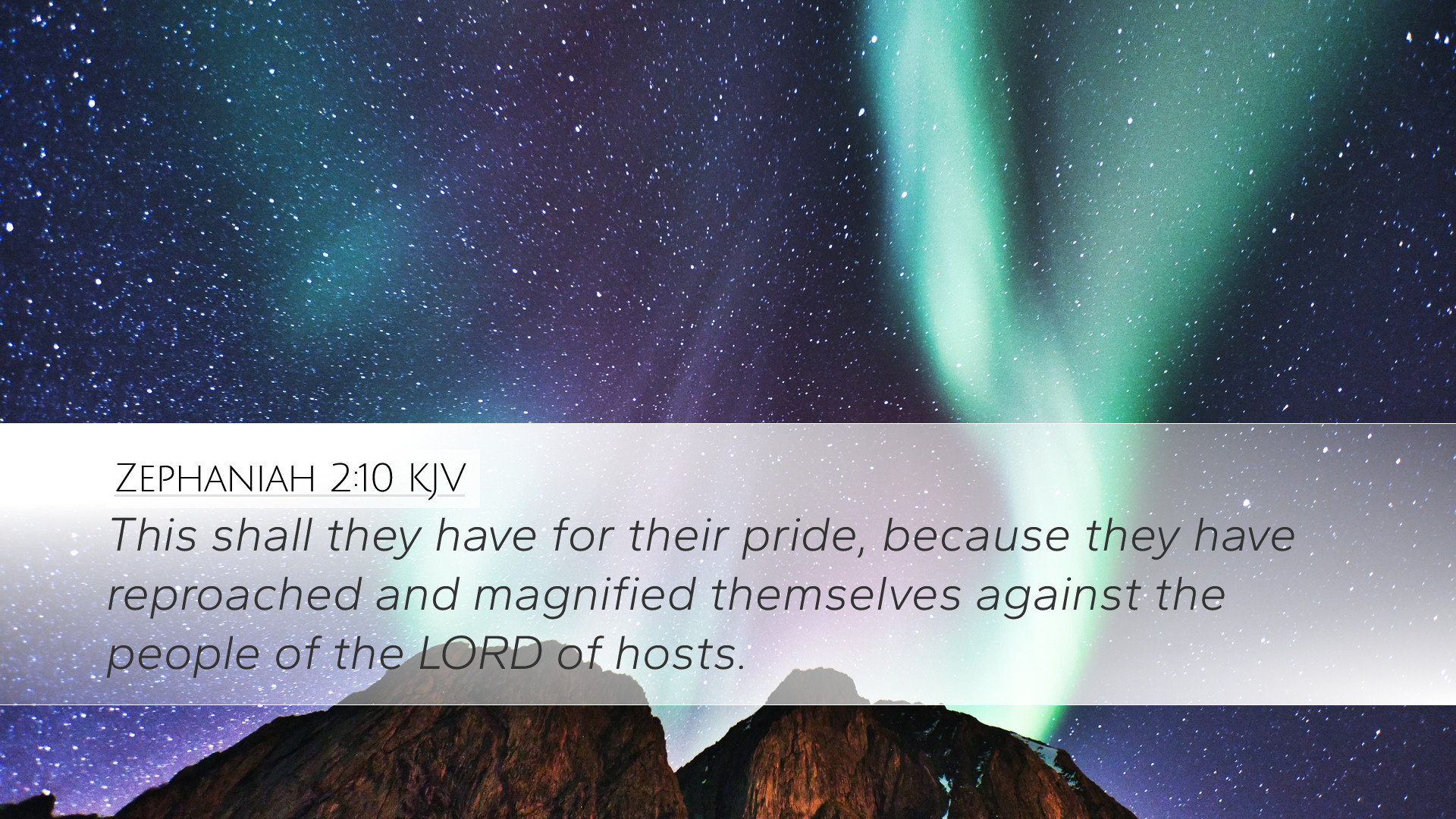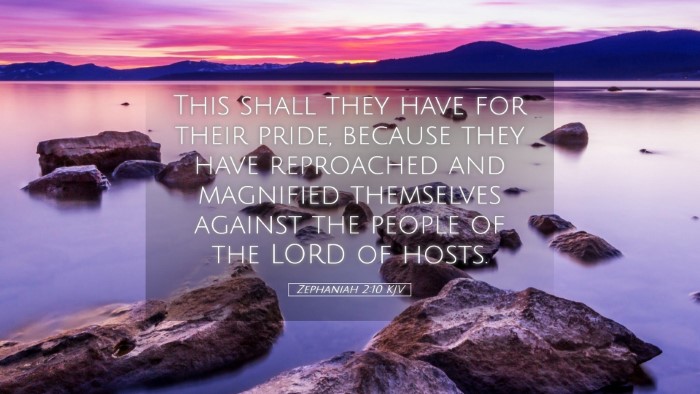Old Testament
Genesis Exodus Leviticus Numbers Deuteronomy Joshua Judges Ruth 1 Samuel 2 Samuel 1 Kings 2 Kings 1 Chronicles 2 Chronicles Ezra Nehemiah Esther Job Psalms Proverbs Ecclesiastes Song of Solomon Isaiah Jeremiah Lamentations Ezekiel Daniel Hosea Joel Amos Obadiah Jonah Micah Nahum Habakkuk Zephaniah Haggai Zechariah MalachiZephaniah 2:10
Zephaniah 2:10 KJV
This shall they have for their pride, because they have reproached and magnified themselves against the people of the LORD of hosts.
Zephaniah 2:10 Bible Commentary
Bible Commentary on Zephaniah 2:10
Verse Reference: Zephaniah 2:10 - "This shall they have for their pride, because they have reproached and magnified themselves against the people of the LORD of hosts."
Introduction
In this critical verse of prophecy, the words of Zephaniah reveal the impending doom upon the nations that have opposed Israel and, by extension, the God of Israel. The prophet speaks especially of the prideful and boastful nations and their eventual judgment. This verse serves as a stark reminder of divine justice and the consequences of arrogance against God's people.
Contextual Analysis
The prophecy of Zephaniah is set against a backdrop of impending disaster for those who have exalted themselves at the expense of God's people. This text is not merely an ancient warning; it carries timeless significance.
1. Historical Context
Zephaniah prophesied during the reign of King Josiah, a period marked by significant social and religious upheaval in Judah (c. 640-609 BC). His audience includes both Israelites and surrounding Gentile nations. Understanding the historical context is crucial for interpreting the implications of the judgments declared in this verse.
2. Literary Context
The verses preceding this declaration (Zephaniah 2:8-9) articulate the sin of the Moabites and Ammonites, who boast against the people of God. It sets a precedent for the illustration of God’s righteous retribution against pride.
Thematic Insights
1. Divine Justice: The statement of punishment for pride emphasizes God's justice. Pride leads to downfall; this principle resonates throughout Scripture. Proverbs elucidates this reality: "Pride goes before destruction" (Proverbs 16:18).
2. Opposition to God’s People: The nations mentioned have not just acted disdainfully but have actively reproached the people of the LORD. It captures a plea to recognize the connection between God's people and God Himself. Attack on believers equates to an affront to their Sovereign.
Commentary Insights
1. Matthew Henry’s Commentary
Henry notes that the pride of these nations represents a denial of God’s authority and an elevation of their own status, leading them to mock the chosen people of God. He asserts that pride is fundamentally a challenge to God's sovereignty and calls attention to how this leads to their own judgment.
2. Albert Barnes’ Notes on the Bible
Barnes comments on the specific judgment pronounced against the proud. He emphasizes that the punishment is not arbitrary; rather, it is a direct response to their arrogance and contempt for God's people. Contextually, he places emphasis on the idea that nations are accountable for their actions against God’s elect.
3. Adam Clarke’s Commentary
Clarke draws from the historical behavior of nations to highlight the principle of divine retribution that stands unaffected by time. He points out that God’s people will ultimately be vindicated and that pride in the human heart always precedes downfall. Clarke attaches significance to the idea that God will turn the fortunes of His people as He dismantles the prideful.
Theological Implications
This verse encapsulates key theological themes that pastorally challenge believers to reflect on their own humility.
- Human Pride vs. Divine Authority: The narrative pushes readers to confront the reality of human pride in light of God's sovereignty.
- God’s Vengeful Mercy: While God is depicted as vengeful, His mercy toward His people shines through, emphasizing protection rather than punishment.
- Judgment and Restoration: The promise of restoration for the humble and contrite amidst judgment for the proud underlines the hope woven through the fabric of prophecy.
Application for Today
For pastors and scholars today, Zephaniah 2:10 challenges us to examine the implications of pride in our ministries and lives. The themes of this verse prompt us to consider the following:
- Humility in Leadership: Leaders should model humility, reflecting Christ's servant heart, rather than the pride exhibited by the nations in Zephaniah's prophecy.
- Awareness of Worldly Attitudes: The church must remain vigilant against cultural pressures that champion pride and self-exaltation.
- Hope for the Oppressed: Understanding God's eventual judgment should empower believers to offer hope and comfort to those oppressed, reassured that God stands with His people.
Conclusion
Zephaniah 2:10 serves as a powerful reminder of the consequences of pride and the assured justice of God. Both its historical context and theological implications offer rich material for reflection and application. The faithful are encouraged to remain humble and recognize that God’s justice will prevail, no matter the circumstances faced by His people. In learning from the past, we find guidance for the present and assurance for the future.


